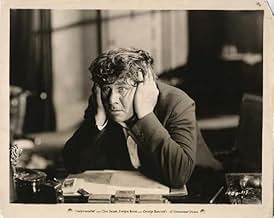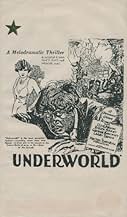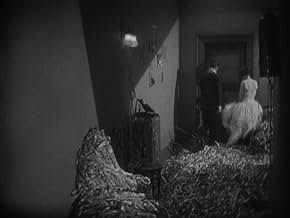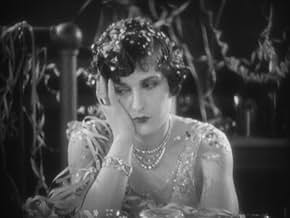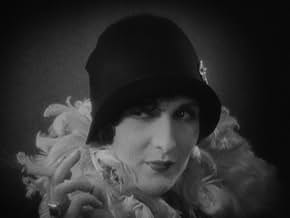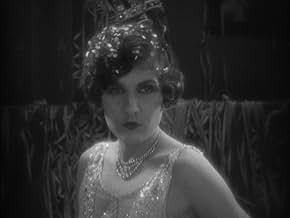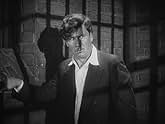IMDb RATING
7.5/10
3.7K
YOUR RATING
Boisterous gangster kingpin Bull Weed rehabilitates his former lawyer from his alcoholic haze, but complications arise when he falls for Weed's girlfriend.Boisterous gangster kingpin Bull Weed rehabilitates his former lawyer from his alcoholic haze, but complications arise when he falls for Weed's girlfriend.Boisterous gangster kingpin Bull Weed rehabilitates his former lawyer from his alcoholic haze, but complications arise when he falls for Weed's girlfriend.
- Won 1 Oscar
- 5 wins total
Alfred Allen
- Judge
- (uncredited)
Shep Houghton
- Street Kid
- (uncredited)
Andy MacLennan
- One of Laughing Faces at the Ball
- (uncredited)
Ida May
- Laughing Woman at the Ball
- (uncredited)
Karl Morse
- 'High Collar' Sam
- (uncredited)
Bob Reeves
- Detective at Railroad Station
- (uncredited)
Julian Rivero
- One of Buck's Henchmen
- (uncredited)
Featured reviews
'Underworld' is the second film of Josef von Sternberg recently seen. The other being 'The Docks of New York'. Although 'Underworld' is the more historically significant of the two films, being the first gangster film and one of the earliest film noir-like films, there is a preference for 'The Docks of New York'. Both are very, very good films though. Sternberg was a fine director, evident in his collaborations with Marlene Dietrich, and George Bancroft deserves a lot more credit as an actor.
As said, 'Underworld' is a very good film. It is not one of Sternberg's best, do prefer the likes of 'Shanghai Empress', 'The Blue Angel', 'The Scarlet Empress' and 'The Devil is a Woman'. It is incredible though that this is only his third solo film, well technically the fifth but two are lost, and his distinctive style seemed not only obvious throughout but fully established, one does not usually that with directors at this early a stage, so 'Underworld' was something of an achievement.
Is 'Underworld' perfect? No as two scenes didn't quite work for me. One was the prison break sequence, which lacked the necessary tension and felt choppily staged.
The other was the ending, after the exciting shoot out it then ends on a tacked on note that is too at odds with what came before and came over as a little heavy-handed as well.
Sternberg's direction though is truly impressive, one does not expect to see direction this polished, visually beautiful or taut at such an early career stage suggestive of a director who had actually been in the profession for years beforehand (that's a compliment by the way). What immediately stands out is the production values, the settings are evocatively seedy yet made oddly attractive at the same time and the cinematography has great audacious style and gritty atmosphere. Sternberg's films always had great use of light and shadow and 'Underworld' is no exception. The music is suitably haunting.
Other than two scenes, the story was riveting with a suitably pull no punches atmosphere, some exciting moments (especially the climactic shoot-out, which is why it's a shame that how it's resolved disappoints) and some nice turns that stopped it from becoming predictable without it becoming confusing. The central relationship to me was handled fine. The performances likewise, with Bancroft showing again with his intensity that he is deserving of more credit. Clive Brook shows here how his acting grew significantly from when he first started and Evelyn Brent is charming.
Concluding, very good. 8/10
As said, 'Underworld' is a very good film. It is not one of Sternberg's best, do prefer the likes of 'Shanghai Empress', 'The Blue Angel', 'The Scarlet Empress' and 'The Devil is a Woman'. It is incredible though that this is only his third solo film, well technically the fifth but two are lost, and his distinctive style seemed not only obvious throughout but fully established, one does not usually that with directors at this early a stage, so 'Underworld' was something of an achievement.
Is 'Underworld' perfect? No as two scenes didn't quite work for me. One was the prison break sequence, which lacked the necessary tension and felt choppily staged.
The other was the ending, after the exciting shoot out it then ends on a tacked on note that is too at odds with what came before and came over as a little heavy-handed as well.
Sternberg's direction though is truly impressive, one does not expect to see direction this polished, visually beautiful or taut at such an early career stage suggestive of a director who had actually been in the profession for years beforehand (that's a compliment by the way). What immediately stands out is the production values, the settings are evocatively seedy yet made oddly attractive at the same time and the cinematography has great audacious style and gritty atmosphere. Sternberg's films always had great use of light and shadow and 'Underworld' is no exception. The music is suitably haunting.
Other than two scenes, the story was riveting with a suitably pull no punches atmosphere, some exciting moments (especially the climactic shoot-out, which is why it's a shame that how it's resolved disappoints) and some nice turns that stopped it from becoming predictable without it becoming confusing. The central relationship to me was handled fine. The performances likewise, with Bancroft showing again with his intensity that he is deserving of more credit. Clive Brook shows here how his acting grew significantly from when he first started and Evelyn Brent is charming.
Concluding, very good. 8/10
The stars are beautifully photographed; the lighting sets the mood, and Ben Hecht's Academy Award winning screenplay all combine to make this the definitive "gangster picture", done before many of the elements became cliches.
With director Josef von Sternberg, and screenwriter Ben Hecht. George Bancroft stars as Bull Weed, a big, intimidating gang boss. After former-lawyer-turned-drunken-bum Rolls-Royce (Clive Brook) witnesses Bull pulling off a bank heist, the gangster brings the drunk back to his hideout, where he takes a shine to him. Bull gives Rolls a job, cleaning him up and having him act as a butler for Bull's moll, Feathers (Evelyn Brent). But the inevitable attraction starts to form between Rolls and Feathers, and Bull is bound to find out eventually. Also featuring Fred Kohler, Helen Lynch, Larry Semon, Jerry Mandy, and Alfred Allen.
While the film looks nice and moves along at a quick pace, it lacks the stylish touches one came to expect with later von Sternberg movies. Bancroft, the first real gangster-movie star, is good as the big 'n blustery Bull, while Brook brings the right amount of dissipated class, and Brent is pretty and multi-dimensional as the kept woman. These gangsters are more a "smash-and-grab" robbery outfit than the usual bootleggers. The movie also ends on what seems a false, anticlimactic note. Howard Hawks did some uncredited work on the script, which may account for the similarities to his and Hecht's later Scarface. Credited writer Hecht, meanwhile, who wanted to disown the picture before its release, went on to win the very first Best Screenplay Oscar for Underworld. This is one of the 101 Gangster Movies to See Before You Die.
While the film looks nice and moves along at a quick pace, it lacks the stylish touches one came to expect with later von Sternberg movies. Bancroft, the first real gangster-movie star, is good as the big 'n blustery Bull, while Brook brings the right amount of dissipated class, and Brent is pretty and multi-dimensional as the kept woman. These gangsters are more a "smash-and-grab" robbery outfit than the usual bootleggers. The movie also ends on what seems a false, anticlimactic note. Howard Hawks did some uncredited work on the script, which may account for the similarities to his and Hecht's later Scarface. Credited writer Hecht, meanwhile, who wanted to disown the picture before its release, went on to win the very first Best Screenplay Oscar for Underworld. This is one of the 101 Gangster Movies to See Before You Die.
Bull Weed is a boisterous gangster bank robber. His girlfriend is the flashy Feathers McCoy. His rival is Buck Mulligan. Wensel is a vagrant but he's no snitch. He's a Rolls Royce of silence. Bull gives Rolls Royce a thousand bucks and makes him a partner in crime. Using Rolls Royce's brains, Bull becomes even more successful. At a wild party, Buck attacks Feathers and an angry drunken Bull kills him. Bull is sent to prison. Feathers convinces Rolls Royce to run away with her but she changes her mind to break him out of prison.
This is a great pre-Depression era gangster movie. It has the classic gangster style and characters. It's a silent movie that lays out the genre that would explode a few years later. This is one in a line of developments in the gangster genre.
This is a great pre-Depression era gangster movie. It has the classic gangster style and characters. It's a silent movie that lays out the genre that would explode a few years later. This is one in a line of developments in the gangster genre.
Books and essays about the gangster genre often cite Josef Von Sternberg's Underworld as an early, influential milestone, but unfortunately it's not easy to track down in any home-viewable format. Recently I was lucky enough to see this film in a theater, accompanied by live music in a packed house of enthused buffs. Whenever possible, this is the way to see a silent movie! The combination of a good score and the response of a simpatico crowd can really bring these works to life. And while there are some dramas of the '20s that show their age and provoke giggles at the wrong moments, this one is not in that category. Underworld holds up, and offers an unlikely yet oddly credible romantic triangle set in a milieu of violent crime. Like all of Von Sternberg's work it's exquisitely well photographed, and like many late silent films takes full advantage of a range of dynamic devices, including a "whip-pan" from face to face in one early scene and a startlingly fast montage of close-ups in another. But what makes this movie click isn't flashy cinematography or editing, it's the chemistry between a trio of top-drawer players working at full steam.
The story is built around three personalities: Bull Weed, played by George Bancroft, "Feathers," played by Evelyn Brent, and "Rolls Royce," played by Clive Brook. Bancroft is unforgettable as Bull, an outlaw of the old school who robs banks and jewelry stores single-handed. The character is, in some respects, the model for gangland kingpins played in later years by Jimmy Cagney and Paul Muni, and yet in a sense he's not a "gangster" at all, for he works solo and has only a handful of allies who show up at key moments and then vanish. Bull doesn't travel with bodyguards or hang out with the boys; despite his natty suits and urban lifestyle he suggests a Western bad man who rides alone. In the early scenes when he's at the top of his game Bull is boisterous, punctuating every conversation with gusts of hearty laughter, but as his situation darkens the laughter vanishes and the guy suddenly resembles an actual bull in an arena, grim and beady-eyed, still physically powerful but cornered and bewildered over how it could have happened. It's easy to see why this performance made George Bancroft so popular at the time: he's a larger-than-life actor with one of those homely/attractive faces, along the lines of an Edward G. Robinson or a Wallace Beery, not handsome but decidedly charismatic.
The beautiful Evelyn Brent is Bull's girlfriend Feathers, so called because of her feathery outfits. Although her character is not as fully delineated as Bancroft's Brent manages to convey a great deal of information with her fascinating eyes. It's clear that Feathers is a lot more intelligent than she lets on. She stays with Bull out of loyalty and gratitude but is well aware of his limitations, and increasingly unhappy about her own dependent status as his "moll." When an opportunity arises to run away with a more attractive and substantial guy she is immediately tempted, even if it means toying with the idea of betraying Bull to the cops, but she's also decent enough to recognize her obligation to him. Bull, after all, risks everything as a direct result of defending her honor when she's attacked. Feathers, despite her froufrou outfits and a nickname more suitable to a bimbo, is smart, sensitive, and surprisingly ethical for someone in her position.
Bancroft and Brent are terrific, but for my money the most memorable performance in Underworld is delivered by Clive Brook. Before this I'd seen Brook in several other films (including Von Sternberg's Shanghai Express opposite Marlene Dietrich), most often playing noble, stiff-upper-lip Englishmen, handsome and respectable but just a bit dull. Here, Brook is a revelation. In the opening scenes he's so decrepit he's not even recognizable, playing against type as a washed-up bum, unshaven and bleary-eyed. We learn that Brook's character is an attorney who went crooked and eventually became an alcoholic, but we aren't told much more. However, like Brent, the actor tells us everything we need to know that isn't directly stated in the text. His transformation begins when Bull Weed takes a liking to him, nicknames him "Rolls Royce" and makes him, in effect, his lieutenant. Much of what happens after that point concerns the growing tension between the three characters as an unavoidable attraction develops between Feathers and Rolls Royce, although they fight temptation and struggle to remain loyal to their boss. The scenes between the trio really heat up as the sexual tension between Feathers and Rolls Royce deepens.
Underworld isn't as flamboyantly violent as some of the famous crime flicks of the '30s and '40s, but there are a number of stylistic touches that mark it as a definite progenitor of those films. For instance, just before the climactic gun battle, Bull takes a sympathetic interest in an orphaned kitten, a motif echoed years later in This Gun for Hire. At another point, with rather heavy irony, a crook is gunned down in a flower shop before a wreath reading "Rest In Peace." A drawback as the film rolls along is the pile-up of increasingly unlikely plot twists, especially where Bull's escape from jail is concerned, although the momentum of events tends to carry the viewer along. Also, while the writing is generally taut, one title card during the gangsters' party sequence is so over-written it suggests a witches' coven. (This line drew chuckles at the screening I attended.) Aside from that unfortunate lapse into purple prose, Underworld holds up beautifully, at least as well as the more familiar gangster classics of the '30s it influenced. This film deserves the attention that should come with a full restoration and greater availability.
The story is built around three personalities: Bull Weed, played by George Bancroft, "Feathers," played by Evelyn Brent, and "Rolls Royce," played by Clive Brook. Bancroft is unforgettable as Bull, an outlaw of the old school who robs banks and jewelry stores single-handed. The character is, in some respects, the model for gangland kingpins played in later years by Jimmy Cagney and Paul Muni, and yet in a sense he's not a "gangster" at all, for he works solo and has only a handful of allies who show up at key moments and then vanish. Bull doesn't travel with bodyguards or hang out with the boys; despite his natty suits and urban lifestyle he suggests a Western bad man who rides alone. In the early scenes when he's at the top of his game Bull is boisterous, punctuating every conversation with gusts of hearty laughter, but as his situation darkens the laughter vanishes and the guy suddenly resembles an actual bull in an arena, grim and beady-eyed, still physically powerful but cornered and bewildered over how it could have happened. It's easy to see why this performance made George Bancroft so popular at the time: he's a larger-than-life actor with one of those homely/attractive faces, along the lines of an Edward G. Robinson or a Wallace Beery, not handsome but decidedly charismatic.
The beautiful Evelyn Brent is Bull's girlfriend Feathers, so called because of her feathery outfits. Although her character is not as fully delineated as Bancroft's Brent manages to convey a great deal of information with her fascinating eyes. It's clear that Feathers is a lot more intelligent than she lets on. She stays with Bull out of loyalty and gratitude but is well aware of his limitations, and increasingly unhappy about her own dependent status as his "moll." When an opportunity arises to run away with a more attractive and substantial guy she is immediately tempted, even if it means toying with the idea of betraying Bull to the cops, but she's also decent enough to recognize her obligation to him. Bull, after all, risks everything as a direct result of defending her honor when she's attacked. Feathers, despite her froufrou outfits and a nickname more suitable to a bimbo, is smart, sensitive, and surprisingly ethical for someone in her position.
Bancroft and Brent are terrific, but for my money the most memorable performance in Underworld is delivered by Clive Brook. Before this I'd seen Brook in several other films (including Von Sternberg's Shanghai Express opposite Marlene Dietrich), most often playing noble, stiff-upper-lip Englishmen, handsome and respectable but just a bit dull. Here, Brook is a revelation. In the opening scenes he's so decrepit he's not even recognizable, playing against type as a washed-up bum, unshaven and bleary-eyed. We learn that Brook's character is an attorney who went crooked and eventually became an alcoholic, but we aren't told much more. However, like Brent, the actor tells us everything we need to know that isn't directly stated in the text. His transformation begins when Bull Weed takes a liking to him, nicknames him "Rolls Royce" and makes him, in effect, his lieutenant. Much of what happens after that point concerns the growing tension between the three characters as an unavoidable attraction develops between Feathers and Rolls Royce, although they fight temptation and struggle to remain loyal to their boss. The scenes between the trio really heat up as the sexual tension between Feathers and Rolls Royce deepens.
Underworld isn't as flamboyantly violent as some of the famous crime flicks of the '30s and '40s, but there are a number of stylistic touches that mark it as a definite progenitor of those films. For instance, just before the climactic gun battle, Bull takes a sympathetic interest in an orphaned kitten, a motif echoed years later in This Gun for Hire. At another point, with rather heavy irony, a crook is gunned down in a flower shop before a wreath reading "Rest In Peace." A drawback as the film rolls along is the pile-up of increasingly unlikely plot twists, especially where Bull's escape from jail is concerned, although the momentum of events tends to carry the viewer along. Also, while the writing is generally taut, one title card during the gangsters' party sequence is so over-written it suggests a witches' coven. (This line drew chuckles at the screening I attended.) Aside from that unfortunate lapse into purple prose, Underworld holds up beautifully, at least as well as the more familiar gangster classics of the '30s it influenced. This film deserves the attention that should come with a full restoration and greater availability.
Did you know
- TriviaThe film was predicted to be a flop, was shelved by Paramount and eventually released in only one theater in New York. Screenwriter Ben Hecht demanded that his name was taken off the credits. As a result of strong word-of-mouth the movie became an enormous hit and won Hecht the first of his two Academy Awards.
- Quotes
'Bull' Weed: -There was something I had to find out - - and that hour was worth more to me than my whole life.
- ConnectionsFeatured in The House That Shadows Built (1931)
- How long is Underworld?Powered by Alexa
Details
Box office
- Gross US & Canada
- $1,642,194
- Runtime1 hour 20 minutes
- Sound mix
- Aspect ratio
- 1.33 : 1
Contribute to this page
Suggest an edit or add missing content


